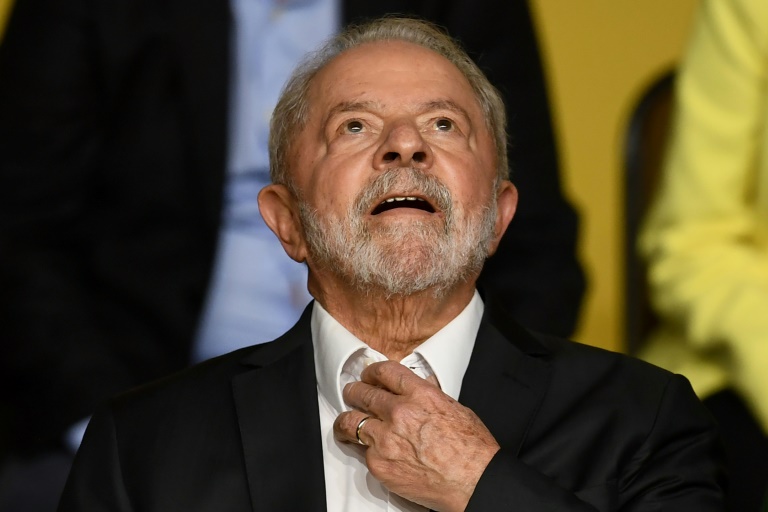Brazil’s Lula: President to pariah and back

President Luiz Inacio Lula da Silva was once called ‘the most popular politician on Earth’ by no less than Barack Obama
Brasilia – Luiz Inacio Lula da Silva rose from childhood poverty to Brazil’s highest office and record approval ratings, only to lose some of his shine in an explosive corruption scandal.
His prison term served and convictions since expunged by a court, the 77-year-old is now back to serve a third term as president after narrowly beating far-right leader Jair Bolsonaro in deeply divisive October elections.
Lula, as he is affectionately known, managed to garner 50.9 percent of the vote to make a spectacular comeback as leader of Latin America’s biggest economy.
He ended back-to-back presidential terms from 2003 to 2010 with an approval rating never seen before, or since, of 87 percent.
The former metalworker left office as a blue-collar hero who presided over a commodity-fueled economic boom that helped lift 30 million people out of poverty.
But then his fortunes changed.
Found guilty of graft in Brazil’s biggest-ever corruption investigation, nicknamed Operation Carwash, Lula spent 580 days in jail from April 2018 to November 2019.
He has always insisted he was the victim of a political plot that saw Bolsonaro win elections in 2018, with Lula — the charismatic favorite — sidelined.
– Stain of corruption –
Disgust with Lula’s Workers’ Party (PT) helped propel Bolsonaro into office.
But the vitriolic and divisive conservative quickly lost popularity as he oversaw Covid-19 carnage, environmental destruction, and made comments criticized as racist, sexist and homophobic.
Then, in March 2021, Brazil’s Supreme Court annulled Lula’s convictions, allowing him back into the political arena.
The court found bias by Sergio Moro, the lead judge in the case against Lula, who has always denied the charges. Moro went on to become Bolsonaro’s justice minister.
The ruling, however, did not declare Lula innocent of the charges centered around kickbacks for juicy contracts given to state-run oil company Petrobras.
The scandal engulfed some of Brazil’s most influential politicians, business executives and the PT.
The stain of corruption turned Lula into a pariah for many Brazilians, and the 2022 elections went down to the wire.
While many have fond memories of economic prosperity under Lula’s rule and he remains deeply popular among poor communities especially in Brazil’s northeast — his fiefdom — many others voted for him merely to see the back of Bolsonaro.
This was Lula’s sixth presidential campaign.
– Peanut vendor –
Lula grew up in deep poverty, the seventh of eight children born to a family of illiterate farmers in the arid northeastern state of Pernambuco.
When he was seven, his family joined a wave of migration to the industrial heartland of Sao Paulo.
Lula worked as a shoeshine boy and peanut vendor before becoming a metalworker at the tender age of 14.
In the 1960s, he lost a finger in a workplace accident.
Lula rose quickly to become head of his trade union, and led major strikes in the 1970s that challenged the then-military dictatorship.
In 1980, he co-founded the Workers’ Party, standing as its candidate for president nine years later.
Lula lost three presidential bids from 1989 to 1998, finally succeeding in 2002 and again four years later.
– ‘Most popular politician’ –
Despite fears at the time that his brand of leftism would be too radical, Lula’s 2003-2010 administration mixed trailblazing social programs with market-friendly economic policy.
He gained a reputation as a moderate and pragmatic leader.
Lula also turned Brazil into a key player on the international stage, helping it secure the 2014 World Cup and the 2016 Olympics in Rio de Janeiro.
Once described by former US president Barack Obama as “the most popular politician on Earth,” the bearded, leftist hero with his trademark raspy voice mixes political skill with a folksy touch that endeared him to many worldwide.
“He’s a very gifted politician. He’s a natural-born negotiator,” International Crisis Group Brazil consultant Leonardo Paz told AFP.
“Lula managed to bring almost everybody from the center-right to the left on his side against Bolsonaro,” in the October election.
These included centrist Geraldo Alckmin, who had unsuccessfully challenged Lula for the presidency in 2006, and will now be his vice president.
The twice-widowed father of five survived throat cancer and in 2017 lost his wife of four decades, Marisa Leticia Rocco, to a stroke.
Lula has said he is again “in love as if I were 20 years old” with Rosangela “Janja” da Silva, a sociologist and PT activist 21 years his junior whom he married in May.
Lula has said he will not seek another term after this one.
